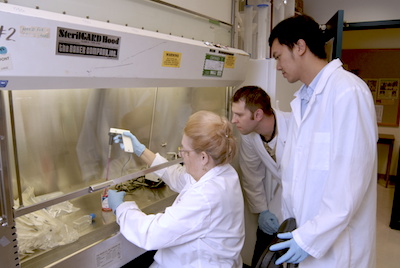NEWS
Student Success Starts Here
Building Pathways to a Master's in Biotech
 Last fall, Middlesex and Northeastern University were awarded a $4.4 million partnership
grant from the National Science Foundation to provide more than 500 scholarships to
students studying biotechnology.
Last fall, Middlesex and Northeastern University were awarded a $4.4 million partnership
grant from the National Science Foundation to provide more than 500 scholarships to
students studying biotechnology.
“We chose Middlesex as our academic partner on this grant because they graduate the largest number of students in biotechnology each year at the associate’s degree level,” said Mary Loeffelholz, Dean of Northeastern’s College of Professional Studies.
Over the next 5 years, scholarships will be awarded to low-income and under-represented minority students who participate in an accelerated Associates to Masters’ Degree Program in biotechnology, known as “A2M.”
The strength of Middlesex’s Biotechnology program helped pave the way for this partnership “Northeastern chose MCC for the A2M program because we are the best,” said Dr. Mariluci Bladon, Chair of the Biotechnology program here at MCC.
“Our program – which started in 1990 – was the very first associate degree program in biotechnology in Massachusetts. We carry a Platinum endorsement from the Massachusetts Life Science Education Consortium.”
Through A2M, all 66 credits from MCC’s associate degree transfer to Northeastern’s bachelor’s degree program. “Once a Middlesex student transfers to Northeastern, they are usually able to complete their BA in two years, and then get a Masters in Biotechnology in one additional year," said Dr. Elizabeth Zulick, Assistant Teaching Professor, and Faculty Director of the Healthcare and Biotechnology Domain at Northeastern University.
“Additionally, we have worked closely with Middlesex over the past few years to build a true partnership: building articulation agreements into all of our bachelor’s programs, creating on-campus tours, presenting at student groups, and working with their faculty,” said Loeffelholz. “This grant was an ideal way to highlight a strong pathway we had already built for students, and provide those students with more financial and social support. We are also excited that any student, from any community college, can take advantage of this pathway once they begin at Northeastern.”
Currently, biotechnology jobs are plentiful and continue to grow. According to data from the U.S. Bureau of Labor Statistics, employment in science, technology, engineering and math-related occupations are projected to increase to more than 9 million jobs nationwide through 2022.
"Students who graduate from MCC are prepared to go into the workforce or continue on to get a bachelor's degree. Our A2M program at Northeastern is designed to let students work during the day and take classes at night, all while advancing their career,” said Zulick.
Additionally, Middlesex and Northeastern have partnered with biotech companies – like Vertex, Pfizer, Novartis, Shire, the MassBioEd Foundation, and the Mass Life Sciences Center – to provide students paid internships, another gateway for students looking to enter the Biotech world.
Middlesex’s Biotechnology Advisory Board is another key to keeping the associates degree program current and ensuring students are keeping up with latest trends in the field.
“We have a large group of advisors who work in the industry. They see what we are doing and give suggestions to keep us on track regarding technology.”
“Once, an advisory board member made a recommendation to use a technology that we couldn’t afford in our labs. So they suggested we bring students to their company to be trained.”
Biotechnology is a burgeoning field according to Bladon, and for good reason. We use innovative products developed via breakthroughs in biotech all the time.
“Biotechnology, literally surrounds us and we don’t even notice. For example, when you drink a beer, it was fermented by using biotech,” said Bladon.
“Or, we can also take living organisms – bacteria or living cells – and insert desired genes into them. These altered genes are then introduced into a patient’s cells to promote a therapeutic response. For example, a hemophiliac cannot naturally clot blood. However, modified genes could be introduced to help the patient clot their own blood.”
“The newest technology on the horizon is called CRISPR (clustered regularly interspaced short palindromic repeats). It’s a technology that lets you edit genes directly; you can cut out the mutant gene directly, and input the new gene with very positive results.”
In Bladon’s 30 year career at Middlesex, she’s seen all types of biotech students come through the door. “I’ve seen electricians, bus drivers, and IT people come to us to change careers. And of course we have many students that are straight out of high school”
And Bladon says they have all gone on to enjoy successful careers by only needing an inquisitive mind, and a love of science. “They don’t need a background in science, that’s what we provide. Our students can go as far as they want”
— Ron Campbell